Related Research Articles
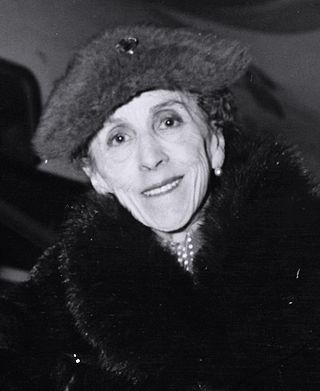
Baroness Karen Christenze von Blixen-Finecke was a Danish author who wrote works in Danish and English. She is also known under her pen names Isak Dinesen, used in English-speaking countries, Tania Blixen, used in German-speaking countries, Osceola, and Pierre Andrézel.

The Kamba or Akamba people are a Bantu ethnic group who predominantly live in the area of Kenya stretching from Nairobi to Tsavo and north to Embu, in the southern part of the former Eastern Province. This land is called Ukambani and constitutes Makueni County, Kitui County and Machakos County. They also form the second largest ethnic group in 8 counties including Nairobi and Mombasa counties.

Wangarĩ Muta Maathai was a Kenyan social, environmental and a political activist and the first African woman to win the Nobel Peace Prize. As a beneficiary of the Kennedy Airlift, she studied in the United States, earning a Bachelor's Degree from Mount St. Scholastica and a Master's Degree from the University of Pittsburgh. She went on to become the first woman in East and Central Africa to become a Doctor of Philosophy, receiving her PhD from the University of Nairobi in Kenya.
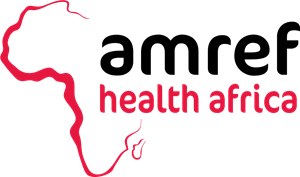
Amref Health Africa was founded in 1957 by three surgeons as the Flying Doctors of East Africa. Three doctors – Sir Michael Wood, Sir Archibald McIndoe and Tom Rees – drew up a plan to provide medical care in East Africa, where they had all worked for many years as reconstructive surgeons.

Grace Emily Ogot was a Kenyan author, nurse, journalist, politician and diplomat. Together with Charity Waciuma she was the first Anglophone female Kenyan writer to be published. She was one of the first Kenyan members of parliament and she became an assistant minister.
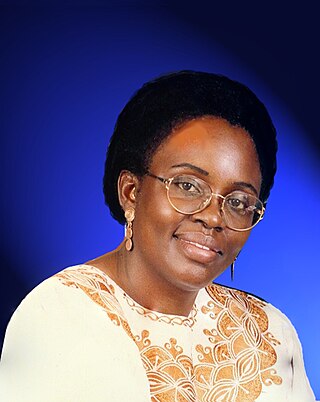
Margaret Atieno Ogola was a Kenyan novelist who wrote The River and the Source and its sequel, I Swear by Apollo. The River and the Source follows four generations of Kenyan women in a rapidly changing country and society. The book has been on the KCSE syllabus for many years, and it won the 1995 Commonwealth Writers' Prize for best first book, Africa Region. Ogola completed her final book, titled Mandate of the People, before her death and it is set to be released posthumously. She was also the recipient of the Familias Award for Humanitarian Service of the World Congress of Families.
Sir Michael Wood was born on 28 January 1918 in the United Kingdom. He studied medicine, and in 1943 he qualified as a surgeon and soon after was married to Susan Buxton, daughter of African missionaries.
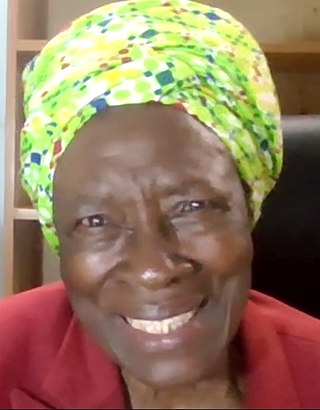
Miriam Khamadi Were is a Kenyan public health advocate, academic, and recipient of the first Hideyo Noguchi Africa Prize. In 2022 she has been nominated for the Nobel Peace Prize for her work in public health.
Farm Africa is a UK-based charitable organization set up in 1985 that works with farmers, pastoralists and forest communities in eastern Africa. The charity promotes sustainable agricultural practices, strengthens markets and protects the environment in rural Africa. Farm Africa has offices in the United Kingdom, Kenya, Tanzania, Ethiopia and Uganda.
Mary Anne Fitzgerald is a British journalist, development aid worker and author, best known for her international war reporting in Africa, and two successful books.
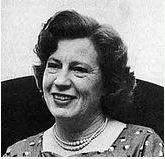
Eugenie Dorothy Hughes, was a Kenyan architect, politician, social reformer and disability activist. She founded the Kenyan Council of Social Services and served as the head of the Sports Association for the Disabled. As the first East African female architect, she owned her own firm and is best known for her design of the Cathedral of the Holy Family in Nairobi.
Anne Spoerry was a French-born physician, based for most of her career in Kenya as a "flying doctor" affiliated with Amref Health Africa.
Betty Muthoni Gikonyo is a Kenyan medical entrepreneur, pediatric cardiologist and one of the country's best known healthcare professionals. She has been featured on CNN's African Voices and the BBC's Africa Business Report. Gikonyo is a Co-founder and the Chief Executive Officer at the Karen Hospital in Nairobi, Kenya.

Nancy Lee Caroline,, was an American physician and writer who worked in emergency medical services (EMS). She was a Medical Director of Freedom House, an emergency ambulance service that assisted underserved populations in Pittsburgh in the 1960s and 1970s. She was also the first medical director of Magen David Adom, Israel's Red Cross Society, and was later called by colleagues, "Israel's Mother Teresa".
Kellen Eileen Kariuki is an accountant, businesswoman and corporate executive in Kenya. Since January 2015, she is the executive director and CEO of the Unclaimed Financial Assets Authority (UFAA), an agency of the central government of Kenya. The government agency, created by Act of parliament in 2011, collects unclaimed funds in the financial system, including un-cashed checks, unclaimed insurance proceeds, cash in dormant bank accounts and money in similar situations in financial institutions. The UFAA then attempts to re-unite the funds with their rightful owners or heirs, upon proper identification. In the meantime, the UFAA invests the money on behalf of the owners, to keep up with inflation.
Karithi Ruth Wanjiru Nduati is a Kenyan Pediatrician and Epidemiologist who also teaches at the University of Nairobi College of Health Sciences. She is also currently leading an interdisciplinary program through the University of Nairobi School of Medicine to educate physician-researchers to best implement HIV treatment and prevention methods backed by research. The program was funded by the Fogarty Training Grant which is a part of the PEPFAR funds the country of Kenya received.

Rhodia Mann is a writer, researcher, bead and jewelry designer, and historian of several traditionally-pastoralist tribes in Kenya, including the Samburu and Borana tribes of northern Kenya. She has published six books and is the creator of a documentary, The Butterfly People.

Githinji Gitahi is a Kenyan medical doctor who serves as the Global Chief Executive Officer of Amref Health Africa as well a former co-chair of the UHC2030 Steering Committee. In July 2021, he was appointed as a Commissioner in the Africa COVID-19 Commission.

The Nairobi Gallery is an art gallery located in the capital of Kenya. The gallery is dedicated to showcasing African art.

Ellinor Catherine Cunningham van Someren was a Ugandan-born British medical entomologist. She specialised in mosquitoes, identifying at least thirty-three new species while employed by the Kenyan Health Service and partaking in scientific surveys in Kenya, Tanzania, and Somalia. In 1962, she was a consultant on yellow fever to the World Health Organization. Van Someren was appointed an Officer of the Order of the British Empire in the Queen's Birthday Honours in 1974 for diplomatic services in scientific research overseas.
References
- 1 2 3 4 5 6 Hughes, Richard (12 July 2006). "Obituary: Susan Wood". the Guardian. Retrieved 15 March 2021.
- ↑ "Our Founders". Amref Health Africa. Retrieved 15 March 2021.
- 1 2 3 4 "People - Groups Making a Difference". BioElectric Shield. Retrieved 15 March 2021.
- ↑ Design, Harper Grace (2020). "Handcrafted Artisan Jewelry". Harper Grace Design. Retrieved 17 March 2021.
{{cite web}}: CS1 maint: url-status (link)